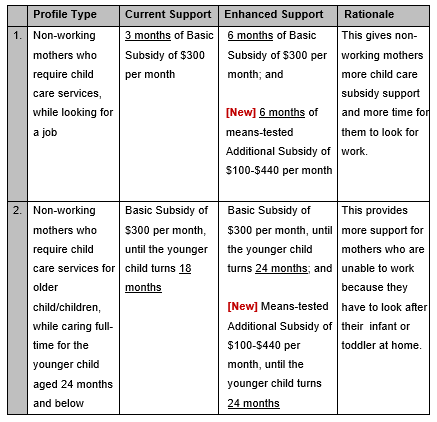1 As part of our ongoing review of preschool subsidy schemes and processes, the Early Childhood Development Agency (ECDA) will be making the following changes.
Enhancing Child Care Subsidy Support for Non-Working Mothers
2 From March 2019, ECDA will provide better support for non-working mothers who are in the midst of seeking employment as well as those who are full-time caregivers for their younger children.
3 To help families with child care expenses, non-working mothers are eligible for a monthly Basic Subsidy of $150. Working mothers1 are eligible for Basic Subsidy of $300, as well as means-tested Additional Subsidies2.
4 On a case-by-case basis, ECDA provides higher subsidies to non-working mothers, under Special Approval. For example, non-working mothers who require child care services when they are in the midst of seeking employment, as well as mothers who are unable to work due to medical reasons or caregiving commitments3, are considered for higher subsidy support.
5 To better support job-seeking mothers and mothers of preschool children who are caring full-time for a younger child, ECDA will extend Additional Subsidies to them and lengthen the duration for which these mothers may receive more subsidies for child care. This will apply to new applications for Special Approval received from 1 March 2019 onwards. The table below illustrates.
Table 1 Enhanced Subsidy Support for Non-Working Mothers under Special Approval

6 These enhancements are expected to benefit around 5,000 families every year.
Greater Certainty for Parents Receiving Subsidies
7 Currently, ECDA verifies the working status of mothers annually, in order to review and update infant or child care subsidies that preschool children receive.
8 From this year, ECDA will verify the working status of mothers, as well as their household incomes (i) at the point of preschool enrolment, (ii) upon a change in programme (i.e. from infant care to child care), and (iii) at the end of Nursery 2 (or the year the child turns four). Parents who may be eligible for more subsidies because of a change in household income may, however, still apply for a review at any time.
9 This change will provide parents with greater certainty on the amount of subsidies they will receive, even if they transit between jobs or take on care-giving responsibilities. It will also reduce the administrative burden on parents as well as preschools who assist in administering the subsidies.
Greater Convenience for Parents and Preschools - Streamlined Subsidy Application and Administrative Processes
10 As part of the Early Childhood Industry Transformation Map4, ECDA will introduce an enhanced centre management system, or CMS, to the sector this year. This new IT platform will bring greater convenience to parents and preschools by simplifying applications for subsidy and financial assistance, as well as other administrative processes such as licence application and child enrolment.
11 Parents will only need to fill in one form to apply for the various subsidies and financial assistance available, down from the current three. Preschools will also benefit from less manual processing and will no longer need to retain copies of birth certificates and NRICs for subsidy applications. This smoothens service delivery and boosts sector productivity, benefiting around 20,000 new families applying for subsidy applications every year.
Promoting Occupational Health and Safety for Preschool Staff
12 To improve the health and well-being of staff working in preschools, ECDA and the Health Promotion Board will commission an occupational health and safety assessment for the Early Childhood sector later this year.
13 As part of this assessment, a panel of experts will develop resources to promote occupational health and safety, as well as make recommendations to enhance Human Resources (HR) practices and working conditions in preschools. This initiative is in line with ongoing industry transformation efforts to raise productivity and uplift our Early Childhood professionals, who are at the heart of good quality preschool services.
ISSUED BYEARLY CHILDHOOD DEVELOPMENT AGENCY (ECDA)
Annex A.pdf Existing child/infant care subsidies by working status
Annex B.pdf Questions and answers
1Mothers are deemed to be working if they work at least 56 hours a month, which is about 2 days a week.
2Only households with monthly household income of $7,500 and below, or Per Capita Income of $1,875 and below are eligible for Additional Subsidy.
3Refer to Annex A for a summary of child care subsidies available, based on the working status of the mother.
4The Early Childhood Industry Transformation Map was launched in 2018. It encapsulates initiatives co-developed by ECDA and sector partners, such as the Association of Early Childhood and Training Services (ASSETS), unions and preschool operators, to meet the need for quality manpower in a sustainable manner, through three strategies (i) supporting innovative services, (ii) enabling productive processes and (iii) uplifting the Early Childhood profession.